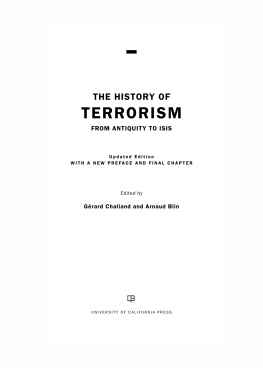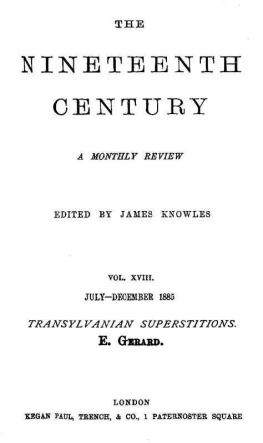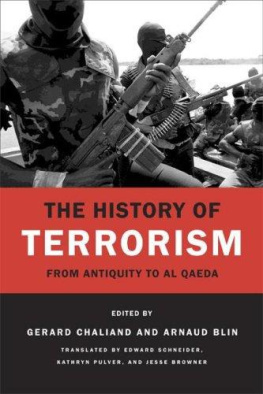Chaliand Gerard - The History of Terrorism
Here you can read online Chaliand Gerard - The History of Terrorism full text of the book (entire story) in english for free. Download pdf and epub, get meaning, cover and reviews about this ebook. publisher: University of California Press, genre: Politics. Description of the work, (preface) as well as reviews are available. Best literature library LitArk.com created for fans of good reading and offers a wide selection of genres:
Romance novel
Science fiction
Adventure
Detective
Science
History
Home and family
Prose
Art
Politics
Computer
Non-fiction
Religion
Business
Children
Humor
Choose a favorite category and find really read worthwhile books. Enjoy immersion in the world of imagination, feel the emotions of the characters or learn something new for yourself, make an fascinating discovery.
- Book:The History of Terrorism
- Author:
- Publisher:University of California Press
- Genre:
- Rating:3 / 5
- Favourites:Add to favourites
- Your mark:
- 60
- 1
- 2
- 3
- 4
- 5
The History of Terrorism: summary, description and annotation
We offer to read an annotation, description, summary or preface (depends on what the author of the book "The History of Terrorism" wrote himself). If you haven't found the necessary information about the book — write in the comments, we will try to find it.
The History of Terrorism — read online for free the complete book (whole text) full work
Below is the text of the book, divided by pages. System saving the place of the last page read, allows you to conveniently read the book "The History of Terrorism" online for free, without having to search again every time where you left off. Put a bookmark, and you can go to the page where you finished reading at any time.
Font size:
Interval:
Bookmark:

Publi avec le concours du Ministre franais charg de la culture, Centre national du livre. Published with the assistance of the French Ministry of Cultures National Center for the Book.
The publisher gratefully acknowledges the generous contribution to this book provided by the Literature in Translation Endowment Fund of the University of California Press Foundation, which is supported by a major gift from Joan Palevsky.
Updated Edition
WITH A NEW PREFACE AND FINAL CHAPTER
Edited by
Grard Chaliand and Arnaud Blin

UNIVERSITY OF CALIFORNIA PRESS
University of California Press, one of the most distinguished university presses in the United States, enriches lives around the world by advancing scholarship in the humanities, social sciences, and natural sciences. Its activities are supported by the UC Press Foundation and by philanthropic contributions from individuals and institutions. For more information, visit www.ucpress.edu.
University of California Press
Oakland, California
2007, 2016 by The Regents of the University of California
ISBN 978-0-520-29250-5 (paper)
ISBN 978-0-520-96600-0 (ebook)
The Library of Congress has cataloged an earlier edition of this book as follows:
Library of Congress Cataloging-in-Publication Data
Histoire du terrorisme. English
The history of terrorism : from antiquity to al Qaeda / edited by Grard Chaliand and Arnaud Blin ; translated by Edward Schneider, Kathryn Pulver, and Jesse Browner.
p. cm.
Includes bibliographical references and index.
ISBN -13: 978-0-520-24533-4 (cloth : alk. paper)
ISBN -13: 978-0-520-24709-3 (pbk. : alk. paper)
1. TerrorismHistory. I. Chaliand, Grard, 1934. II. Blin, Arnaud. III. Title.
HV6431.H5713 2007
363.32509dc222006032389
Manufactured in the United States of America
25 24 23 22 21 20 19 18 17 16
10 9 8 7 6 5 4 3 2 1
To the memory of Alain and Bernard Mangin
Grard Chaliand and Arnaud Blin
Ariel Merari
Grard Chaliand and Arnaud Blin
Grard Chaliand and Arnaud Blin
Grard Chaliand and Arnaud Blin
Olivier Hubac-Occhipinti
Yves Ternon
Grard Chaliand and Arnaud Blin
Grard Chaliand and Arnaud Blin
Grard Chaliand and Arnaud Blin
Grard Chaliand and Arnaud Blin
Philippe Migaux
Philippe Migaux
Philippe Migaux
Franois Gr
Arnaud Blin
Rohan Gunaratna
Grard Chaliand
The genesis of this book is directly tied to the events of September 11, 2001. Initially published in France in 2004it came out the very day of the Madrid attacks on March 11it has since then been translated into several languages, including English, with the American edition published in 2007. Fifteen years after 9/11, and almost ten years after the first publication of the English edition, terrorism is still, tragically, though not surprisingly, a major concern of our time.
In September 2015, when we first discussed issuing a new edition of this book with the University of California Press, the terrible events that were to imprint 2015 with their indelible mark had yet to unfold. Sadly, France has now joined nations throughout the world in claiming its own /11 moment. Between 2001 and 2015, Indonesia (202 killed in Bali in 2002), Spain (191 killed in Madrid in 2004), the United Kingdom (52 killed in London in 2005), India (166 killed in Mumbai in 2008), and Pakistan (144 killed, mostly children, in Peshawar in 2014), among others, were attacked by terrorists. Only days after the New Years celebrations in 2016, nations were already bracing for a new wave of attacks after eleven tourists were killed in a suicide bombing in Istanbul.
The year 2015 was particularly gruesome, with a series of unprecedented attacks by the Islamic State of Iraq and Syria (ISIS), also known as Islamic State, Islamic State of Iraq and the Levant (ISIL), and, in Arabic, Daech/Daesh, a formidable force that did not even exist ten years previously when al Qaeda and Osama bin Laden dominated The year started with the shocking January attack on the French satirical newspaper Charlie Hebdo and the execution of shoppers in a nearby Parisian kosher minimart. Eleven months later on November 13, a stones throw away from the offices of Charlie Hebdo , ISIS terrorists killed 130 people in a combined attack on the theater Le Bataclan and nearby restaurants. Just days before the November attacks in Paris, ISIS downed a Russian airliner, killing all 224 passengers, and placed a bomb in downtown Beirut that claimed 43 victims. Shortly thereafter, a married couple, one a homegrown jihadist, the other a recent immigrant from Pakistan, killed 14 people in San Bernardino, California.
Though one of the characteristics of terrorism is to deform reality by projecting an overinflated image of its actual physical impact, the last fifteen years have shown an alarming trend in the number of victims of terrorism. According to the latest figures, this number has increased ninefold between 2000 and 2014. From 2013 to 2014, the number of victims worldwide jumped from 18,111 to 32,685. The most lethal terrorist organization is Boko Haram (6,444 victims), followed closely by ISIS (6,073 victims), which operates in a war zone. Boko Haram, once affiliated with al Qaeda, is a jihadist group that since its emergence in 2002 has operated mainly in Nigeria, a democracy not formally at war. Still, even these unprecedented numbers are dwarfed by the daily casualties that took place during World War I: at the battle of Verdun (1916) alone, France and Germany together claimed 262,000 dead or missing for a total of more than 700,000 casualties, including the wounded soldiers. In March, the deadliest month of that same year, close to 4,000 soldiers were lost each day in battle. In contrast, the total number of deaths by terrorism in France since 1800 is less than a tenth of that number, even when one factors in the 2015 attacks.
From 2000 to 2014, the Western world accounted for just 2.6 percent of the total number of victims of terrorism worldwide, a surprisingly low number that includes the nearly three thousand people killed on September 11, 2001. If those killed on 9/11 were excluded, that percentage would fall to 0.5 percent. Yet it is those rare attacks that do take place in the West that get the most attention. While this is an unsurprising phenomenon given the predominance of Western media, it justifiably arouses critical reactions: like much else, terrorism is intrinsically unfair to its victims who, even in the face of tragedy and death, are not given equitable treatment.
At the same time that jihadism tightened its grip on global terrorism, the long active and redoubtable Tamil Tigers were finally crushed by government forces in Sri Lanka. A Marxist-inspired nationalist movement, the Tamil Tigers were responsible for dozens of violent terrorist attacks throughout their decades long struggle. But like many groups before them such as the Peruvian Sendero Luminoso, the Tigers were ultimately annihilated by a government unhampered by ethical or political restraints. Curbed but still standing after five decades of war, democratic Colombia appears to be slowly reaching an agreement with the Fuerzas Armadas Revolucionarias de Colombia guerrillas that might terminate one of the longest conflicts of our time. Illustrating the complex psychological ramifications of political terrorism, regionalist movements in Europe such as the Basque Euskadi ta Askatasuna that were once synonymous with violent terror tactics have been forced to tone down their activities rather than risk being associated with jihadist terrorism. These urban guerrilla movements that harken back to the postcolonial left-wing romanticism that gave us Ernesto Che Guevara are surprisingly not altogether dead, as exemplified by the rise of the Naxalite movement in India. The Naxalites are animated by a diehard Maoist ideology, and they resort to classic terror tactics in the land that once saw the Thugs terrorize local populations at will. Responsible for thousands of attacks and implanted in several regions of India, the Naxalites kill dozens of innocent victims each year (202 in 2014).
Font size:
Interval:
Bookmark:
Similar books «The History of Terrorism»
Look at similar books to The History of Terrorism. We have selected literature similar in name and meaning in the hope of providing readers with more options to find new, interesting, not yet read works.
Discussion, reviews of the book The History of Terrorism and just readers' own opinions. Leave your comments, write what you think about the work, its meaning or the main characters. Specify what exactly you liked and what you didn't like, and why you think so.












